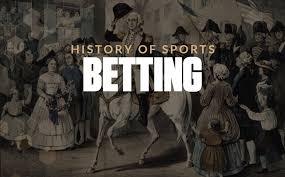Sports betting has a long and colorful history, deeply rooted in human civilization. From ancient civilizations to the modern-day legal sports betting landscape, the evolution of betting on sports has mirrored the development of society, culture, and laws. This article explores the key milestones, events, and transformations that have shaped the sports betting industry over the centuries.
The earliest recorded forms of sports betting can be traced back to ancient civilizations. The Greeks, Romans, and Egyptians were all known to wager on athletic contests, such as the Olympic Games and chariot races. Ancient Greece, in particular, was a hub for early sports betting, where spectators often placed wagers on the outcomes of competitive events like the Olympic Games, which were held every four years. Betting was an integral part of the ancient sports experience, adding excitement and competition for both participants and audiences.
Roman gladiatorial contests also saw a significant amount of betting. Romans would place wagers on the outcomes of these bloody events, further embedding the concept of betting into the fabric of public entertainment. In ancient Egypt, even early forms of dice games, which involved betting, became popular, providing a glimpse into the evolution of gaming and gambling in society.
As civilizations evolved, so too did the practice of sports betting. The Middle Ages saw a decline in formalized sports competitions, but various forms of gambling continued to thrive. Archery contests, jousting tournaments, and horse races became popular among the nobility, where bets were placed on the outcomes of these events.
Betting during this period was often informal, carried out in private settings or among local communities. However, it laid the foundation for the more structured sports betting systems that would emerge in the future.
The 17th and 18th centuries marked a turning point in the development of sports betting, as modern organized sports began to emerge. The establishment of horse racing as a formal sport provided the first real opportunity for the creation of modern sports betting markets. The first documented betting shop, known as the "turf" or "bookmaking" shop, opened in England in the 17th century, where people could place bets on horse races.
In the 19th century, the rapid industrialization of society led to the rise of more organized sports events such as cricket, boxing, and, of course, horse racing. With these developments, betting became more formalized, and bookmakers emerged as essential figures in organizing bets on these events. The introduction of odds, wagering systems, and betting parlors helped to create a burgeoning sports betting industry, particularly in the United Kingdom and later in the United States.
The 20th century was a period of significant expansion for the sports betting industry. With the rise of global sports such as soccer, basketball, and baseball, betting markets grew exponentially. The legalization of sports betting in several parts of the world further propelled its growth. In the U.S., however, sports betting faced significant legal restrictions for much of the century.
The landmark event in American sports betting history came in 1992, when the U.S. government passed the Professional and Amateur Sports Protection Act (PASPA), which banned sports betting nationwide, except in states that had already legalized it. This move caused a significant black market for sports betting to thrive, with many bettors seeking illicit ways to place their wagers.
The major shift in sports betting in the United States came in 2018 with the Supreme Court's landmark decision to strike down PASPA, allowing states to regulate and legalize sports betting individually. This ruling opened the floodgates for states to adopt legal sports betting, creating a massive boom in the industry. States like Nevada, New Jersey, and Pennsylvania quickly became leaders in the legal sports betting space, while other states, including Michigan, Illinois, and New York, followed suit.
With the growth of online and mobile sports betting platforms, the industry has seen an explosion in participation. Bettors can now place wagers on nearly any sport, from traditional events like football and basketball to niche sports like esports and table tennis. The digital revolution has also brought in a younger generation of bettors, with mobile apps and online sportsbooks providing convenient access to betting markets.
Looking ahead, the future of sports betting is likely to be shaped by technological advancements and changing regulations. The use of artificial intelligence (AI) and machine learning in predicting odds and outcomes has already begun to change the way bookmakers and bettors approach the industry. Additionally, advancements in blockchain technology could pave the way for more secure and transparent betting platforms.
The increasing popularity of esports has also opened new frontiers for sports betting. As younger generations become more involved in competitive gaming, the demand for esports betting platforms will continue to rise.
Sports betting has come a long way since its ancient origins, evolving from informal wagers in ancient Greece to a multi-billion-dollar industry. The journey of sports betting reflects broader societal changes, including advancements in technology, shifts in cultural attitudes, and the increasing legalization of betting in various regions.
As sports betting continues to grow and evolve, it is clear that this activity will remain an integral part of sports culture for generations to come. Whether it’s placing a bet on the Super Bowl, a Premier League match, or an esports competition, the thrill of predicting outcomes and testing one’s luck continues to be a central part of the sports experience.
Ancient Greece and Rome: Early forms of sports betting on Olympic Games and gladiatorial contests.
17th Century: The first betting shops open in England, particularly focused on horse racing.
19th Century: Emergence of organized sports like cricket and boxing with formal betting systems.
1992: The U.S. passes the Professional and Amateur Sports Protection Act (PASPA), banning most forms of sports betting.
2018: U.S. Supreme Court overturns PASPA, allowing states to legalize sports betting.
2020s: Digital platforms and mobile betting apps fuel the growth of legal and regulated sports betting across the U.S. and around the world.

